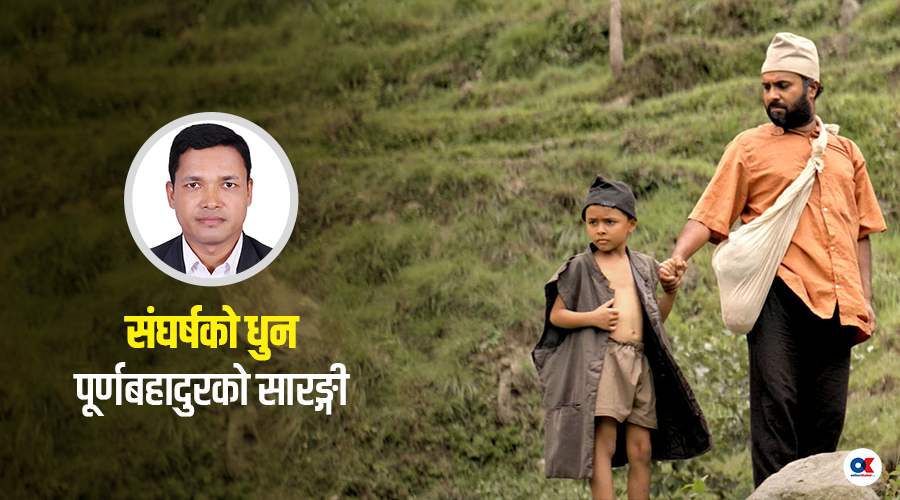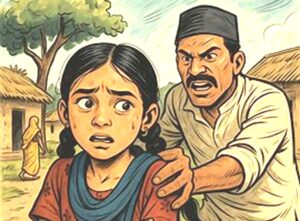Now there is a lot of talk about ‘Poorna Bahadur’s sarangi’. Cinema halls are crowded with viewers of all age groups. A Nepali film has never been discussed so much in the media and social networks before. The fact that Nepali films can be absorbed by the audience in this way is not only a matter of pride for the Nepali film sector, but also for the art sector of the country.
While watching Purna Bahadur’s sarangi, you will feel the two aspects of our Nepali society’s family and social environment. Basically, the role of the father in the patriarchal family at the family level and the condition and relationship of the dependent family have been presented in a tight manner. Looking at the other side from the social level, here is a picture of the life lived by the people of the society in a difficult manner.
When it starts with ‘Dazu Baaju Le Ta Gu Khai Chhin Ni’, it raises a lot of curiosity about the role of Baazu in the story of the film. Like the story of other films, it also has a committee on love, marriage, love pirti, love relationship of married couple and conversation. When Poorna Bahadur and Batuli have a child, then the scenario that all couples face is seen there. That is the parents’ understanding and plan for the future of their children. ‘Batuli, who married Purna Bahadur with great affection, expresses her disappointment and disgust towards the profession of playing the sarangi after seeing Purna Bahadur’s sorrow and the humiliation he received in the society. She decides not to teach her son the sarangi and not let him walk with his father.
She reminds Purna Bahadur to give up playing sarangi, but Purna Bahadur doesn’t budge. One day Purna Bahadur’s father suddenly falls unconscious and Purna Bahadur takes him to the hospital with the help of a friend, but Batuli does not seem to go to the hospital to see his mother-in-law. Batuli is hoping to go to the city to give her son a good education, and meets Thito who has come from the city. When Thito told her to go to the city to educate her son, the letter that Thito left at Batuli’s house said that she ran away with him, and the way back to Batuli’s house is blocked. The son who went with him also ran away from the road and returned with his father.
Then the mother’s role in the story ends here. On the other hand, the situation where Batuli went to Poil on the same day that Purna Bahadur’s father died and left the ghat shows the family’s merciless nature towards his father-in-law, while on the other hand, Purna Bahadur is presented in the terrible pain of being taken to the hospital to treat his father and dying at the same time that his wife left home. Although the story tries to depict the family environment of poor families in the ancient society, it also presents the role, responsibilities and responsibilities of a son in a joint family in the modern society and the pain caused by the result of family imbalance and disharmony. Nowadays, due to the trend of going abroad, some parents are alone at home, while mostly the parents of men who went to Malaysia and the Gulf countries stay at home with their daughters-in-law. Some parents have left the villages they used to live in and live with their sons and daughters in foreign cities. In a separate environment, the infirm parents who are at the end of their lives and the wife who is passionate about doing something for the children from a different culture and culture, the awkward situation when the relationship is strained, and the balance between the responsibilities of the son and the needs of the parents while staying in a joint family and the wishes and desires of the wife. In the film, you can also see the scene of how the family relationship breaks down when it is not enough.
After the death of Purna Bahadur’s father, the story gradually takes away the role of the mother in the family and presents the role of the father more strongly. The story turns towards the father’s hard struggle and sacrifice for his son’s education and social prestige. While growing up with the father, the psychological impact of the family discord of the parents on the child can be assessed here. Purna Bahadur does not remember even when his wife repeatedly reminds him to give his son a good education and lead a distinguished life, but after Batuli left home, the change in Purna Bahadur for the future of his son’s education and distinguished life gives the impression that the role of the father is to be strengthened.
What will be seen in this film is the complete depiction of the social structure of our Nepalese society. The pain of discrimination and humiliation suffered by the Gandharva community, who make a living by playing the sarangi, has been finely presented in the story. As the profession is being passed down from generation to generation, the transformation of the society has been shown in the situation where education and awareness have changed the profession and become a doctor. It has given the message of how much struggle and suffering one has to do to live a dignified life in the society by breaking the traditions that have been going on for generations.
The situation in which the educated class, which leads the society to the path of ideals, is unable to free itself from the mire of social vices and ugliness, the sad scene of how the religious social norms treat the Gandharva community has shown a mirror of the real life experienced by the marginalized and neglected and Dalit community in the society. Another important aspect of this is that it has given a good message that a change in thinking can be brought about by identifying and understanding the real situation rather than by not knowing or understanding the new generation about the caste discrimination, inequality and oppression that is happening in the society and in history.
On the day of the father-in-law’s death, the daughter-in-law went to the city with someone else, the teacher beat the child because he was wearing a white coat, he was brutally beaten when he went to play the sarangi in religious worship, and the father died without meeting his son who became a doctor after a hard struggle. While watching it, the audience may be curious if it had not gone this far. But there are people in the society who are dealing with such harsh and heartbreaking situations, there are people who seem to have never happened, but in the end, there are people who have survived, and the story of those people has been presented with a heart-rending twist. Seeing this scene, the audience is involuntarily shedding tears.
The story of this film also teaches this – oppression and oppression in the society and continuous struggle against it makes a person a warrior. It makes you able to deal with social obstacles and fight with hundreds of challenges to build your future. Purna Bahadur does not give up his son’s profession of playing sarangi even when his wife reminds him. But when the social humiliation, discrimination and oppression on him increases, his children are beaten in front of his eyes, then he decides to send his son to study so that he can lead a dignified life. No matter how much his friends, relatives and neighbors tease him, he is never disturbed in educating his son. Even when their lives are in danger and even to the last moment of death, they continue to fight. It can be assumed that this firm and unwavering commitment is the strength of his continuous hard struggle against social discrimination, contempt and it.
The sacrifice and dedication of parents for their children is incomparable. Almost all parents have struggled and sacrificed for the bright future of their children. The only difference is who has suffered to what extent and whether the children have followed the right path accordingly. Like Purna Bahadur, there are many anonymous fathers and mothers in the society. The stories of their struggles have not come out and it is not possible to tell all the stories. But the children must respect and assimilate the sacrifice, dedication and struggle of their parents. And it is the duty of a good person to realize the full responsibility towards mother-in-law, who have social and family obligations like parents. Just as a sweet melody is played by pressing the fingers deep into the strings of the sarangi, in the same way, in the film ‘Poorna Bahadur Ko Sarangi’, along with pain, the melody of hard struggle and stubbornness also resonates.








